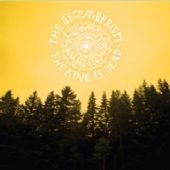
The Decemberists
The King is Dead
(Rough Trade; 2011)
By Eric Sams | 8 March 2011
What sets Cormac McCarthy’s devastating, Pulitzer-prize-winning The Road apart from a jam-packed field of post-apocalyptic pop culture narratives is that he stages his story so long after the Fall has occurred. We join the characters in medias res years and years into the bleak future-less void. By removing his characters from the violence of the apocalypse by a solid decade McCarthy divorces the story from the action/adventure overtones that often dominate the genre, and bleeds his book dry of quaint societal vestiges like religion, hope, or dignity. And then, through all this, he lets shine quick flashes of stripped-bare humanity.
So, now, how long has it been since the hatestorm rolled in on the Decemberists? Their 2009 prog-rock opera, The Hazards of Love, was almost universally dismissed as a pretentious and overwrought experiment for experiment’s sake. The Crane Wife (2006) was only slightly less shrugged off for its unwieldiness and the fact that it played too much to Meloy’s proclivity for bookish melodrama. So it’s fair to say that it’s been at least since Picaresque (2005) that the Decemberists have enjoyed the sort of unqualified general adoration that greeted their first two albums. I don’t know if I’d call that apocalyptic, but for those who have felt the warm kiss of blogosphere consensus, six years of indifference and derision is a long, cold winter. And sure, the Decemberists have a fiercely loyal and not insubstantial fan base rabidly defending their work to the increasingly dwindling population who care enough to contradict them. But they’re really just fellow survivors, running through the woods, doggedly evading internet criticism’s cannibalistic and insatiable taste for the new.
Whatever you may think of the decision, Meloy certainly didn’t shy away from the more divisive elements of his music as criticism of the band—as cloying or grating—began to increase in volume. I mean, it’s hard to imagine someone leaning harder into their shtick than The Hazards of Love. But this year’s The King is Dead takes a decidedly different tack. If it isn’t quite a concession to his detractors, it is at least the first signal from Meloy in a long while that he’s willing to step out of his wheelhouse and try something new. And like the protagonists from The Road, the compelling humanity of The King is Dead lies in the fact that now, years removed from the Fall, it has been pared down to its rugged essentials.
...at least by Decemberists standards, anyway. We’re not talking like, Elvrum minimalism here. King has plenty of sound, plenty of melody, and plenty of moving pieces, but it also has a long-absent sense of reserve. The Decemberists have managed to hold back here their natural inclination to make everything sound so fuckin’ lush. “Don’t Carry It All,” a thematic descendant of the Eagles’ “Take It Easy,” lopes easily along with the thin twang of a harmonica, and Meloy twangs also: “Here we come to a turning of the season / Witness to the arc towards the sun / A neighbor’s blessed burden within reason / Becomes a burden borne of all and one.” Hearing it makes one wonder if Meloy isn’t just a tiny bit relieved to let the yolk slip from his own shoulders for once; relieved to just write songs and sing them without the added pressure of trying to slot them into some ancient fable or complex allegory.
Then, of course, the graceful fingerprints of the inimitable Gillian Welch are all over this record. Meloy has long had a knack for finding excellent female collaborators—the best bits of The Hazards of Love unfailingly involved My Brightest Diamond’s Shara Worden—and Welch’s presence lends credibility to what otherwise might be pigeonholed as an indulgent genre exercise. Instead, the Decemberists should be congratulated for how effortlessly they seem to take to the phrasing and structure of bluegrass, a tradition in which they’ve never done more than dabble. To wit: “Down by the Water,” probably the song on the record with the most legs, perfectly employs Welch’s pristinely resolute voice, as natural as an exhale, repeating the chorus “Down by the water / Down by the old main drag.” The song sets its hook deep and refuses to leave your head after you’ve heard it once.
The King is Dead is an album filled with the sound of the dust settling. The meteoric rise is over, as is the backlash, as is the reaction to the backlash, and the reaction to that reaction, and so on. Now, it seems, we’re just left with the Decemberists pushing their shopping cart through the ashen landscape, trying to make it to the coast. In reviewing “Down by the Water” when it was released as a single, Kaylen posed an astute question about the mercurial nature of Colin Meloy: “Whether or not its possible to have a digestible Meloy and an interesting Meloy co-exist in the same song remains to be seen.” Kaylen and I may differ on this, but for me The King is Dead provides an answer to that question—that yes, it is possible. A good few years on from the rise and partial Fall of the Decemberists, Meloy and Co. are managing, still, to carry the fire.





